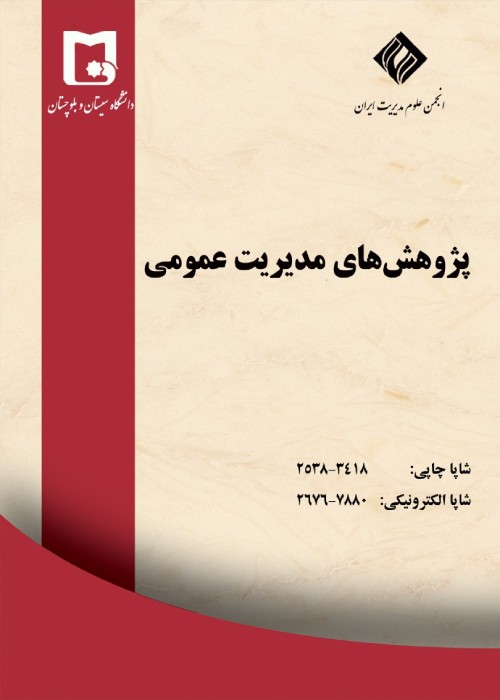Identification and Ranking of Management by Value Dimensions
Author(s):
Article Type:
Research/Original Article (دارای رتبه معتبر)
Abstract:
Higher education is one of the most expensive resources available to society for development and excellence, and its role as an educational institution is not overlooked. Therefore, universities must work as much as possible to upgrade their capacities against challenges and opportunities ahead by showing appropriate reactions. With the help of value-based management, specialized daily activities of staff and faculty lead to strategic thinking. Therefore, the purpose of this study was to identify and rank the value-based management dimensions in Mazandaran Islamic Azad University.
Introduction
Value is one of the most useful capital that plays the main role in the emergence of the organization and identifies and directs its course and activity and it gives the organization a new life. It is considered as a general principle for staff, faculty and students. Given that the values governing the university are generally the most important source of it, therefore, managing these values and sustaining management, staff and faculty members ensures the success of the university's activities, processes and operations. Therefore, this research seeks to identify the dimensions of management based on the value of the university. To this end, the organization performed its most important and effective task in order to achieve more success and improve the quality of providing services to students and society. Finally, considering the necessity of recognizing the dimensions of value management in Islamic Azad University, this research is looking for an answer to this question that what are the dimensions of management based on value at Islamic Azad University? How are they ranked?
Case Study
To identify the management dimensions on the basis of value, 212 questionnaires containing 80 questions were distributed among the subjects including full-time faculty members with academic degrees as associate professors, assistant professors and professors working in Mazandaran Islamic Azad University.
Materials and Methods
The research was applied in terms of purpose and descriptive survey method. A sample of 212 faculty members were selected using stratified random sampling in terms of university degree. In this research, a researcher-made questionnaire was used to collect data. Descriptive statistics and inferential statistics including Cronbach's alpha, exploratory factor analysis and Friedman test were used to analyze the data.
Discussion and Results
The results showed that the 12 selected factors totally 71.305% of the total variance explained the factors are related to management based on value. Value-based management has twelve dimensions including organizational trust, cohesion and integrity, motivational mechanisms, experience and skills, training and empowerment, self-evaluation, vision, organizational commitment, social welfare, resource development, customer orientation, and idealism. All dimensions, management based on value with factor load above 0.5. Therefore, the impact of all dimensions on management based on value is verified. The findings also show that in terms of faculty members, the ranking of these dimensions is different from which, in their view, idealism is ranked first and then motivational mechanisms ranked last.
Conclusion
According to the results of the study, senior executives of Islamic Azad University are advised to adhere to the divine rules and belief in God as a strategic orientation and long-term goals as an ideal umbrella for universities. Providing the most desirable scientific services and satisfaction of students should be their main goals and highlight the culture of satisfaction and value of students in their priority and take serious consideration to increase students' satisfaction, paying attention to their needs, tastes, comments and suggestions. Also, the university management is responsible for developing and promoting trust culture in the organizational environment. By creating training courses and empowerment, commitment, morale promotion, motivation, increased job satisfaction, reduced job stress, improved academic service delivery, increased sense of responsibility, increase decision-making power of staff and faculty members, and satisfaction of students at the university.Keywords:
Language:
English
Published:
Management Researches, Volume:12 Issue: 43, 2019
Pages:
271 to 298
magiran.com/p1999445
دانلود و مطالعه متن این مقاله با یکی از روشهای زیر امکان پذیر است:
اشتراک شخصی
با عضویت و پرداخت آنلاین حق اشتراک یکساله به مبلغ 1,390,000ريال میتوانید 70 عنوان مطلب دانلود کنید!
اشتراک سازمانی
به کتابخانه دانشگاه یا محل کار خود پیشنهاد کنید تا اشتراک سازمانی این پایگاه را برای دسترسی نامحدود همه کاربران به متن مطالب تهیه نمایند!
توجه!
- حق عضویت دریافتی صرف حمایت از نشریات عضو و نگهداری، تکمیل و توسعه مگیران میشود.
- پرداخت حق اشتراک و دانلود مقالات اجازه بازنشر آن در سایر رسانههای چاپی و دیجیتال را به کاربر نمیدهد.
In order to view content subscription is required
Personal subscription
Subscribe magiran.com for 70 € euros via PayPal and download 70 articles during a year.
Organization subscription
Please contact us to subscribe your university or library for unlimited access!



